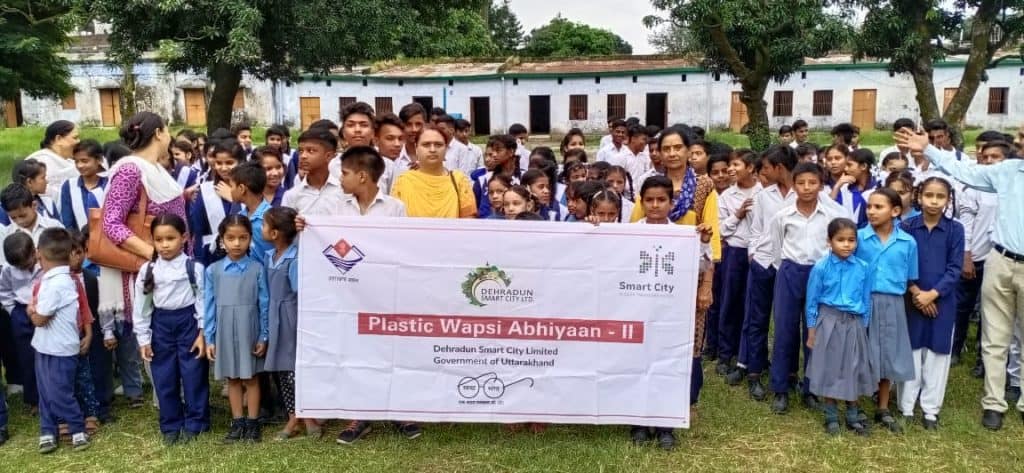With India’s mammoth generation of 26000 tons of plastic waste daily, Indian cities are struggling to manage their plastic waste, with single use plastic (SUP) posing a major challenge. So much so that the Modi government’s big decision to ban SUP from October 2, Gandhi Jayanti, was shelved as the market was not ready to take such a toll without proper alternatives to plastic in place.
However, the government’s recent Swachhata Hi Seva (SHS) campaign, which aims at large scale collection and recycling of plastic waste, is being actively pursued by state governments. The campaign involves concepts like plogging, cleanups and cloth bag distribution drives. The SHS campaign is scheduled to culminate Diwali..
As part of the SHS, the Dehradun Smart City Limited (DSCL) came up with an innovative and community-centric way of managing plastic waste. DSCL initiated an extensive one-month drive titled “Plastic Wapsi Abhiyaan” (Return the plastic) in almost 20 government schools, engaging more than 5000 students and 100 teachers. DSCL also tried to reach out to their families and neighbourhoods. The aim was to trigger behaviour change amongst students to shun use of SUPs and sustainably handle the plastic waste.
DSCL also undertook an extensive capacity-building exercise for these 5000 plus school kids. Students were made aware of low cost and sustainable green alternatives to SUPs, like jute bags, paper cups, bagasse-based cutlery options, steel or copper bottles etc. One notable aspect of the campaign was training school students to stitch bags from used cloth pieces at home and promote the concept of upcycling.

DSCL’s “Plastic Wapsi Abhiyaan” involved almost 20 government schools, engaging more than 5000 students and 100 teachers.
Behavioural change
The campaign, held between Sept 2nd and Oct 2nd, initiated by Sunil Uniyal Gama, Mayor, Dehradun Municipal Corporation and Ashish Kumar Shrivastava (IAS), CEO, DSCL, collected 555 kgs of plastic waste comprising more than 3 lakh pieces of SUP items like wrappers, polybags, pouches etc. The students were taught segregation and proper handling of the plastic waste. The plastic waste was segregated in two categories: recyclable plastic (poly bags, disposables etc.) and non-recyclable plastic (wrappers and snack packets etc.) resulting in 252 Kgs of recyclable plastic waste and 333 Kgs of non-recyclable plastic waste.
DSCL incentivized the campaign with the top three schools and students (in terms of maximum plastic waste collection) being recognised with an award on November 9th by CM Trivendra Singh Rawat on the occasion of the State Formation Day. DSCL also created 168 Plastic Praharis and 20 Plastic Yoddhas. Plastic Praharis were essentially class monitors from each class of the school responsible for executing the campaign and spreading awareness in their neighbourhoods. Plastic Yoddha was a teacher appointed from each school for coordinating and monitoring the campaign with DSCL.
“The Plastic Wapsi Abhiyaan was really an interesting way to learn about issues related to plastic waste management,” said Rosy, a class 10 student, who stood first in the campaign. “I told my parents to start using cloth bags to avoid use of poly bags. Also, as I have now learned how to make paper envelopes and cloth bags, which I will distribute in my family”.
“We were initially not aware of the campaign till the teachers told us about the Plastic Wapsi Abhiyaan,” said Babita, mother of a school student who participated in the abhiyaan. “We were not aware about anything such as single use plastic. I will try that at least at a family level we use cloth bags instead of buying polybags from the market”.
“Triggering behavior change amongst the students and their parents has been the biggest outcome of this campaign,” said Ashish Kumar Shrivastava (IAS), CEO, DSCL. “I am really happy the way students participated and understood the ill effects of SUPs on the environmental well being of the city. This small campaign has shown the entire state on how to overcome our dependence on single-use plastic items. This model has a lot of potential for its scalability at the regional and national level”.
Transformed behaviour change was one of the major outcomes that the government has recognized and is considered the major learning of the campaign. Based on this, DSCL is now planning to launch the next Abhiyan edition in all government and private schools situated in the smart city area.
Plastic waste to fuel
DSCL executed the campaign with the help of a Dehradun based environmental action and advocacy group, Gati Foundation, a Social Technology Partner of the India Institute of Petroleum (IIP), Dehradun and is assisting in executing and monitoring a comprehensive, community-based plastic waste collection system. DSCL and Gati sent the 252 kilos of recyclable plastic waste to the IIP for scientific disposal. The remaining 303 kilos of non-recyclable waste was handed over to the Dehradun Municipal Corporation which is using it in road construction in the city.
The IIP, in fact, has developed a pioneering and environment friendly techology that can convert plastic waste to fuel. Indian Institute of Petroleum (IIP), demonstrated this tech by setting up a pilot waste to fuel plant in August with the capacity to convert 1000 kgs of plastic waste to 800 litres of diesel or 700 litres of petrol, automotive-grade. The technology is still in its infancy, with strict limitations on the kind of plastic it can convert to fuel. Also, the cost and market implications of the technology are being studied. The plant as of now can use all types of plastic except multi-layer plastic used for packing snacks, chips etc., tetra packs and PET bottles.
However, the technology has a strong potential with the Centre planning to build such plants in almost 100 cities in the next phase.